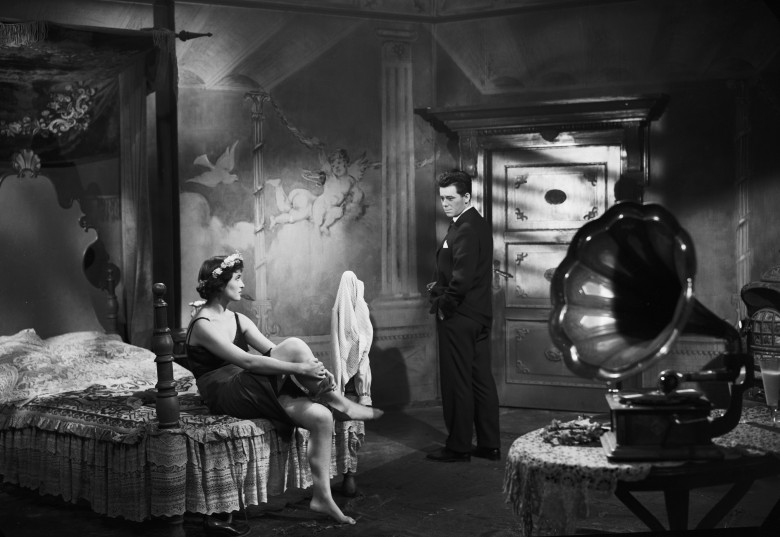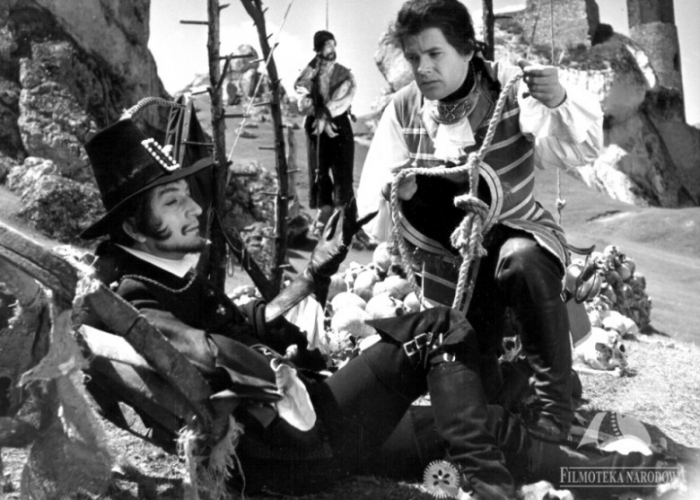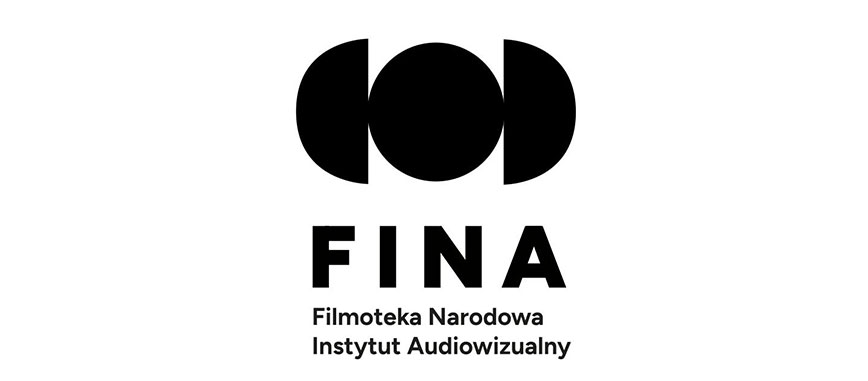
Wojciech Jerzy Has is one of the most original authors of Polish and european cinema. Each of his works is a testimony of his creative imagination and, most of all, of his brilliant adaptation skills. Has brought to the silver screen the literary works that were previously viewed as non-translatable to the language of cinema, thus giving the proof of the endless capacities of cinematography. His ability to innovate, his artistry and unique imagination were appreciated by the biggest masters of cinema, Luis Buñuel, Martin Scorsese or Pedro Almodóvar among others. However, the art of Has was rarely understood by the patrons of culture in the socialist Poland as well as by the critics, who failed to wade through the steps of the maze of Has.
On the occasion of the ninetieth anniversary of birth of W.J.Has and the fifteenth anniversary of his death, both falling this year, we will present in the Iluzjon cinema films directed by him, such as „The Noose” („Pętla”), „Farewells” („Pożegnania”), „The Hour-Glass Sanatorium” („Sanatorium pod klepsydrą”) andthe movie regarded as his greatest masterpiece „The Saragossa Manuscript” („Rękopis znaleziony w Saragossie”).
SCREENINGS
Stolica Room
| 1 IV 20:00 hrs | Farewells (Pożegnania), dir. Wojciech Jerzy Has, Poland 1958 103’ |
| 12 IV 15:15 hrs | The Hour-Glass Sanatorium (Sanatorium pod Klepsydrą), dir. Wojciech Jerzy Has, Poland 1973 129’ |
| 21 IV 17:45 hrs |
Write and Fight (Pismak), dir. Wojciech Jerzy Has, Poland 1984 118’ |
Mała Czarna Room
| 2 IV 20:15 hrs | The unevenftul story (Nieciekawa historia) dir. Wojciech Jerzy Has, Poland 1982 111’ |
| 7 IV 17:45 hrs |
How to be loved (Jak być kochaną) dir. Wojciech Jerzy Has, Poland 1962101’ |
| 9 IV 20:00 hrs | Write and fight (Pismak) , dir Wojciech Jerzy Has, Poland 1984 118’ |
| 13 IV 20:00 hrs | The Noose (Pętla), dir. Wojciech Jerzy Has, Poland 1957 101’ |
| 14 IV 20:00 hrs | Farewells (Pożegnania) , dir. Wojciech Jerzy Has, Poland 1958 103’ |
| 15 IV 20:00 hrs |
The uneventful story (Nieciekawa historia), dir. Wojciech Jerzy Has, Poland 1962 111’ |
|
25 IV 18:00 hrs |
How to be loved (Jak być kochaną), dir. Wojciech Jerzy Has, Poland 1962 101’ |
| 27 IV 20:00 hrs |
The Noose (Pętla) dir. Wojciech Jerzy Has, Poland 1957 101’ |
| 29 IV 19:00 hrs |
The Saragossa Manuscript (Rękopis znaleziony w Saragossie) dir. Wojciech Jerzy Has, Poland 1964 177’ |
| 30 IV 20:00 hrs |
The Hour-Glass Sanatorium (Sanatorium pod Klepsydrą) dir. Wojciech Jerzy Has, Poland, 1973 129’ |
Tickets:
12 – 17 PLN
Reservation:
Kino Iluzjon; ul. Narbutta 50a; 02-536 Warszawa
Box office – 22 462 72 60; iluzjon.rezerwacje@fn.org.pl
MOVIES
Write and fight (Pismak) 118 min., Poland 1984
dir.: Wojciech J. Has; set designer: Władysław Terlecki; camera: Grzegorz Kędzierski; cast: Wojciech Wysocki, Gustaw Holoubek, Zdzisław Wardejn, Jan Peszek, Jerzy Zelnik, Janusz Michałowski, Gabriela Kownacka, Hanna Mikuć, Marzena Trybała
Rafał, publisher and editor of a satirical magazine „The Devil”, gets arrested and put to prison in one cell with Szpicbródka, a famous safe-breaker and Sykstus, a monk accused of murder.
It is the time of the I World War, but it doesn’t matter for Rafał, as the world of the prison is a close enclave, where the writer, isolated from the daily reality, diputes alone with himself on literature and art. An idea of a novel arises in his mind, inspired by the observations of the routine of prison. Rafał is not aware of the reason for his arrest and the information he gets during his first interrogation is not clear either: are these vile articles he had written, offence against morality? It is only later, during a conversation with the investigating officer, that he learns about a gun found in fis flat. The gun was used to kill two people in a terrorist attack.
Apart from a historical background the director focuses on the mystery of the human fate and the problem of passing, going by. Thus W.J. Has creates an insightful psychological portrait of the hero – a lonely, lost man contesting the times he lives in.

An uneventful story (Nieciekawa historia) 111 min., Poland 1982
direction and set design: Wojciech J. Has; camera: Grzegorz Kędzierski; cast: Gustaw Holoubek, Hanna Mikuć, Anna Milewska, Elwira Romańczuk, Janusz Gajos, Marek Bargiełowski
„It ends with what is known for a long time: that a thoughtful life without a fixed viewpoint is not a life – it is an ordeal, a horror”. This is how Anton Tchekhov described the message of An unevenful story. The story, characteristically for the author, presents psychological portraits of the Russian intelligentsia of the late XIXth century – of people deprived of the meaning of their lives. The protagonist of the movie is a renowned professor of medicine, who tries to sum up his life. W.J. Has limited the action time of the Tchekhov story in a bit more than 24 hours. The portrait of the hero is somewhat compatible to those of the previous films of Has – showing lost romantics of The Noose, Roomers , Gold Dreams or The Doll. The director managed to overcome the difficulties of filming a small work of art with very limited plot. He introduced an inner monologue of the hero, accompanied by a refined picture of his surroundings. We get two faces of the professor – inner and outer – which, put together, creates a picture of a split man, torn between doubts and aware of the fact that his life comes to an end and nothing can be changed.

The Hour-glass Sanatorium (Sanatorium pod Klepsydrą) 129 min., Poland 1973
direction and set design: Wojciech J. Has; camera: Witold Sobociński; cast: Jan Nowicki, Tadeusz Kondrat, Irena Orska, Gustaw Holoubek, Bożena Adamek, Filip Zylber, Halina Kowalska, Ludwik Benoit
While adapting the Bruno Schulz stories for screen, Wojciech J. Has managed not only to translate a specific poetic prose of the writer into the film imagery, which was a daring task, but also created a totally original piece of art, brilliantly showing the atmosphere and climate of the Schulz literature. In a surrealistic scenery, together with the hero we try to come back to the world of his childhood, to a small town somewhere in the Eastern borderlands. This unique world is filled with phantoms, wax figures get enlivened from panopticum, historical characters and phantoms of the hero’s imagination appear. This outstanding autobiography written in prose, but containing an element of the purest poetry, found a truly original and admirable equivalent in the vision of Has.

How to be loved (Jak być kochaną) 101 min., Poland 1962
dir.: Wojciech J. Has; set design: Kazimierz Brandys; camera: Stefan Matyjaszkiewicz; cast: Barbara Krafftówna, Zbigniew Cybulski, Artur Młodnicki, Wieńczysław Gliński, Zdzisław Maklakiewicz, Wiesława Kwaśniewska, Wiesław Gołas, Kalina Jędrusik
The film is a psychological drama trying to look at war through the fate of individuals entangled in conflicts. In a series of flashbacks a famous actress comes back to her war memories and to her deep, unfulfilled love for Wiktor, a coleague from theatre, whom she hid in her flat. She was ready for huge sacrifice for him, however, he finally turned out weak and irresponsible. With years the heroine comes to terms with her past, which is painful for her but purifying. The film received The Golden Gate Award at the International Film Festival in San Francisco for the role of Barbara Krafftówna and The FIPRESCI Award in Beirut.

Farewells (Pożegnania) 103 min., Poland 1958
dir.: Wojciech J. Has; set design: Stanisław Dygat, W.J. Has; camera: Mieczysław Jahoda; cast: Maria Wachowiak, Tadeusz Janczar, Gustaw Holoubek, Zdzisław Mrożewski, Irena Netto, Stanisław Jaworski, Stanisław Milski, Hanna Skarżanka
A small psychological drama concentrating on portraying love that burst out unexpectedly between a young man contesting a bourgeois surrounding and a female dancer. The film plot starts in 1939 and its main part takes place during the German occupation of Poland. The lovers meet in a palace of an empoverished countess in Podkowa Leśna. The dancer, thanks to marriage, became an aristocrat. The film is weaved of a delicate matter of moods, undecsribed feelings and gestures, supported by a subtle psychological analysis. Perfectly directed adaptation of the prose of Stanisław Dygat was welcomed by the critics, who stated that W.J. Has not only reliably showed the psychological background of the heros’ behaviour, full of nuances and unclear situations, but also kept the ironically-grotesque aura of their deeds.

The Noose (Pętla) 101 min., Poland 1957
dir.: Wojciech J. Has; set direction.: Marek Hłasko, W. J. Has; camera: Mieczysław Jahoda; cast: Gustaw Holoubek, Aleksandra Śląska, Teresa Szmigielówna, Tadeusz Fijewski, Stanisław Milski
The film tells about one crucial day of an alcohol-addicted man. On that day the hero, accompanied by a woman in love with him, is about to visit a dryling-out clinic. He promised the woman that we wouldn’t leave home without her, but he fails to keep the word. He wanders about the streets aimlessly and finally, on a trivial pretext , he drinks a shot of vodka, then the next one… In a moving way, using scarce measures, the director draws a portrait of a man who lost selfconfidence, who lost belief in friendship, love, in his treatment, who found himself in the noose and can’t see any escape from it. The debut movie of Has is an adaptation of a story of Marek Hłasko uder the same title.

The Saragossa Manuscript (Rękopis znaleziony w Saragossie) 181 min., Poland 1964 (English subtitles)
dir.: Wojciech J. Has; set design: Tadeusz Kwiatkowski; camera: Mieczysław Jahoda; cast: Zbigniew Cybulski, Iga Cembrzyńska, Joanna Jędryka, Kazimierz Opaliński, Sławomir Lindner, Franciszek Pieczka, Ludwik Benoit, Barbara Krafftówna, Beata Tyszkiewicz, Gustaw Holoubek
An adaptation of a multiplotted and multifaceted novel by Jan Potocki was a task equally fascinating and complicated to fulfill. However, W.J.Has managed to find a cinematic key to an unusual work of a poet, traveller, philosopher and soldier. „The Saragossa Manuscript” unites threads of an adventurous movie, fantastic fairy-tale full of weird figures and ghosts, with a philosophical story about human vice and deficiencies. The pivot of the story is a journey of the Walloon guard’s captain of the Spanish king to Madrid. The soldier, travelling the shortest way – through the mountains of Castille – has lots of unusual adventures. A few times the hero comes back to the starting point – to a mysterious tavern and its ghostly surroundings, to begin his journey anew and find himself in the time and space familiar to him, but each time filled with different figures and viewed from different perspectives. The movie, viewed as one of the most original in Polish cinema, is a metaphor of the randomness of the human fate.










